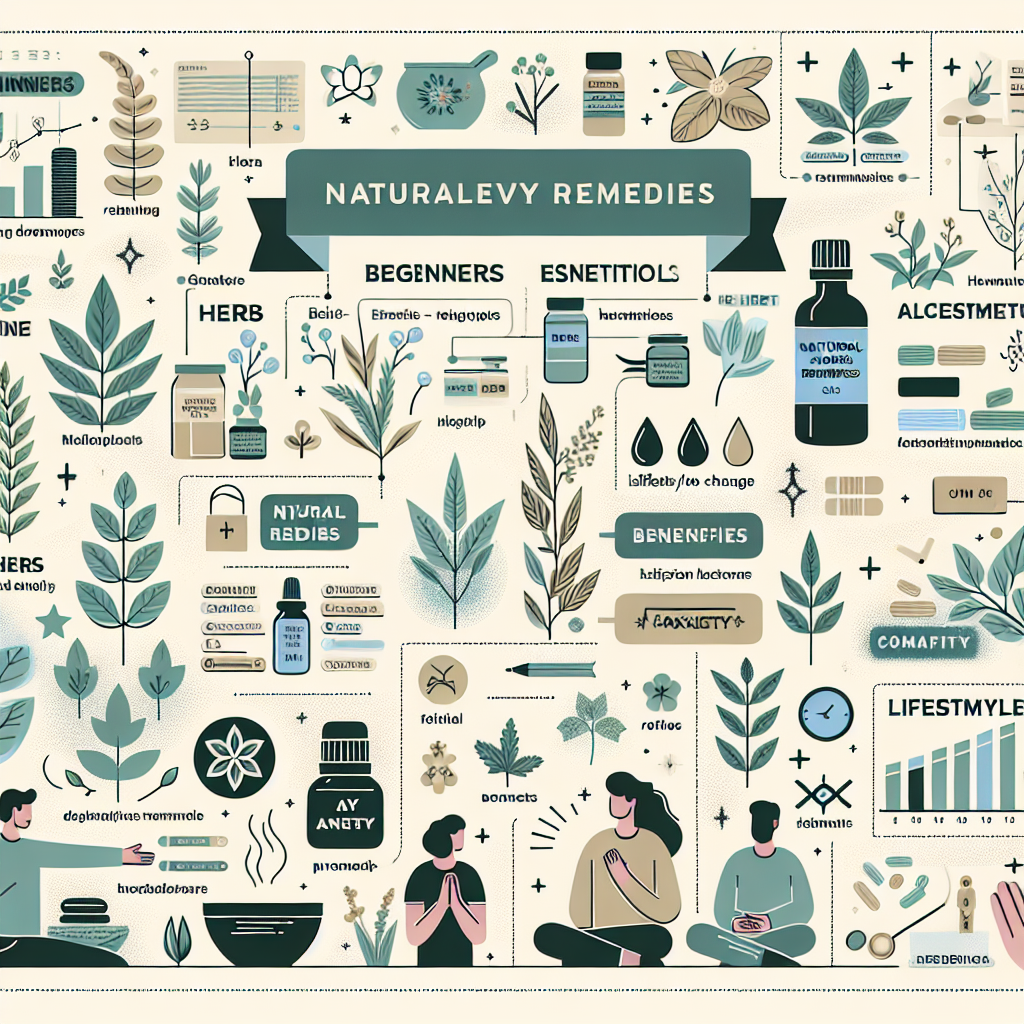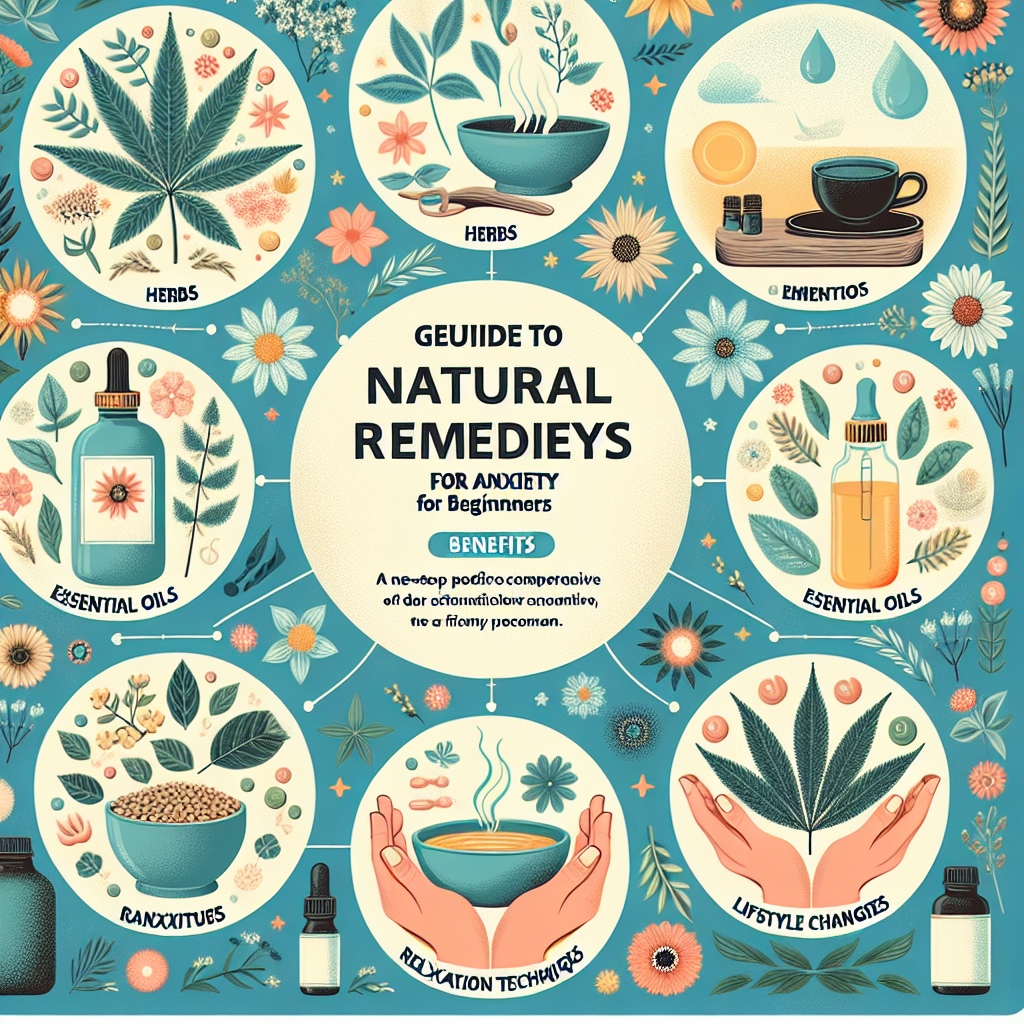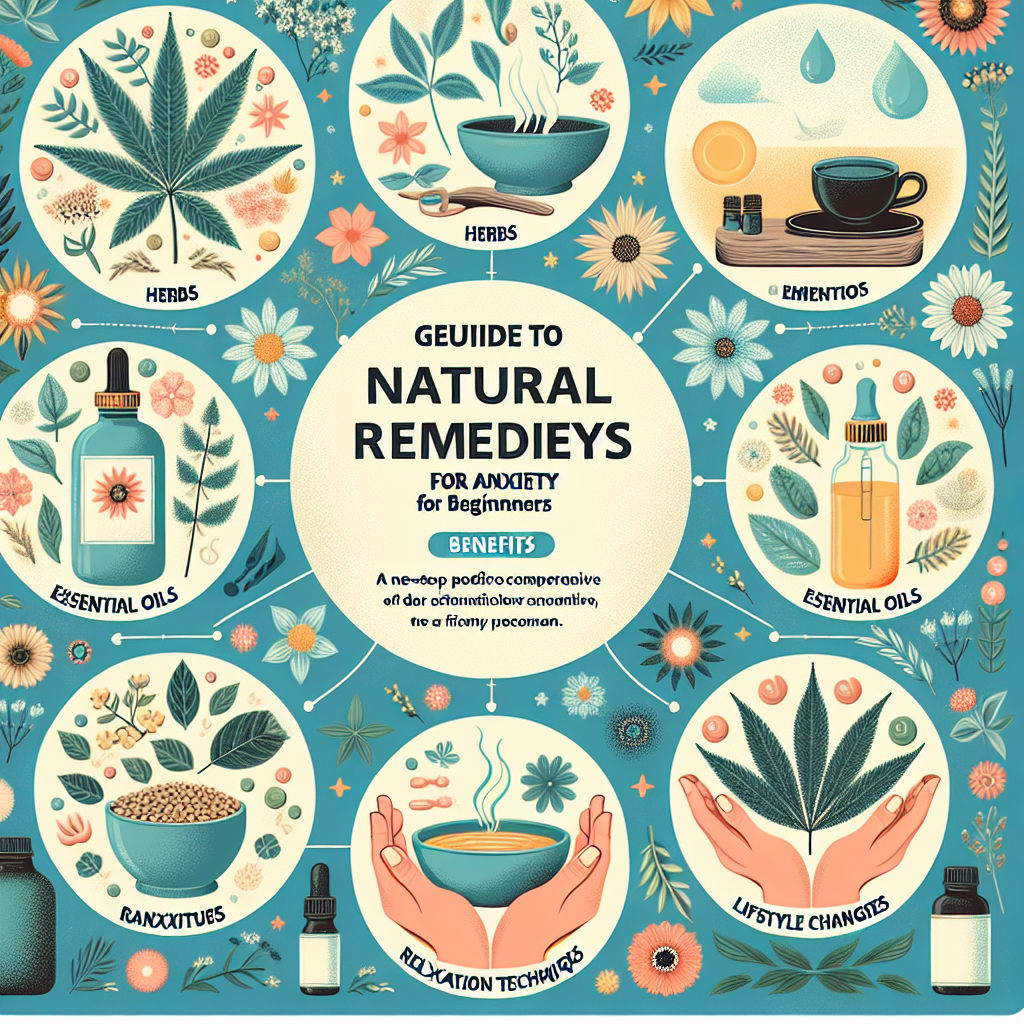Are you tired of feeling overwhelmed by anxiety? Look no further – the solution may be closer than you think. This article acts as your friendly guide to using natural remedies for anxiety, providing you with essential tips and insights to help you find relief. Say goodbye to the constant worry, as we explore the world of natural remedies and empower you to take control of your anxiety.

Understanding Anxiety
Anxiety is a common mental health condition that many people experience at some point in their lives. It is characterized by feelings of worry, fear, and unease, often accompanied by physical symptoms such as rapid heart rate, sweating, and shortness of breath. If you find yourself frequently experiencing these symptoms, it is important to recognize that you may be dealing with anxiety.
Recognizing common symptoms of anxiety
The symptoms of anxiety can vary from person to person, but there are some common signs to watch out for. These may include:
- Feelings of restlessness or irritability
- Difficulty concentrating or focusing
- Constant worrying or racing thoughts
- Trouble sleeping or staying asleep
- Fatigue or lack of energy
- Muscle tension or aches
- Upset stomach or digestive issues
By being aware of these symptoms, you can start to recognize when your anxiety is flaring up and take steps towards managing it.
Understanding the impact of anxiety on daily life
Living with anxiety can be challenging, as it can significantly impact various aspects of your daily life. Anxiety can interfere with your relationships, work performance, and overall well-being. It may prevent you from fully enjoying life and engaging in activities that you once found pleasurable. It is important to address your anxiety and seek support, as managing it can help improve your quality of life and allow you to thrive.
Benefits of Natural Remedies for Anxiety
While there are medications available to manage anxiety, many people prefer to explore natural remedies due to their potential benefits and reduced risk of side effects. Natural remedies can provide relief from anxiety symptoms and help promote overall well-being.
Exploring the advantages of natural remedies over medication
One of the significant advantages of natural remedies for anxiety is that they usually have fewer side effects compared to prescription medications. This is particularly beneficial for those who prefer a more holistic approach or are sensitive to medication. Natural remedies also offer a more sustainable long-term option, as they can be incorporated into a daily routine without the need for constant medication adjustments.
Examining the potential side effects of anxiety medication
Prescription medications for anxiety can have various side effects that some individuals may find undesirable. These can include drowsiness, headaches, dizziness, and even dependency or withdrawal symptoms. By opting for natural remedies, you can potentially avoid or minimize these side effects while still effectively managing your anxiety.
Herbal Remedies for Anxiety
Herbs have long been used to promote relaxation and reduce anxiety symptoms. Incorporating specific herbs into your daily routine can have a calming effect on your mind and body.
Lavender: A calming herb with proven anxiety-relieving effects
Lavender is a popular herb known for its soothing properties. It has been used for centuries to promote relaxation and reduce anxiety symptoms. Whether in the form of essential oil, tea, or dried flowers, incorporating lavender into your daily routine can create a sense of calmness and help alleviate anxiety.
Chamomile: An herb known for its soothing properties
Chamomile is another herb that has a calming effect on the mind and body. It has been traditionally used as a natural remedy for anxiety and insomnia. Chamomile tea is a popular way to reap its benefits, as the act of preparing and sipping a warm cup of tea can be soothing in itself.
Passionflower: A natural remedy for reducing anxiety and improving sleep
Passionflower is often used as a natural remedy for anxiety and sleep problems. It is believed to work by increasing levels of a chemical called gamma-aminobutyric acid (GABA) in the brain, which has a calming effect. Passionflower is available in various forms, including teas, extracts, and supplements, making it easy to incorporate into your anxiety management routine.
Aromatherapy for Anxiety
Aromatherapy involves using essential oils to promote relaxation and improve overall well-being. These concentrated oils derived from plants can have a powerful impact on mood and emotions.
Essential oils and their calming properties
Certain essential oils have been found to have calming properties that can help reduce anxiety. Lavender essential oil, for example, has been widely studied and shown to reduce anxiety symptoms. Other essential oils such as bergamot, chamomile, and ylang-ylang also have anxiety-reducing effects. The pleasant aroma of these oils can induce a sense of calmness and relaxation.
Best ways to use essential oils for anxiety relief
There are several ways to use essential oils for anxiety relief. You can dilute them with a carrier oil, such as coconut or jojoba oil, and apply them to your skin as a massage oil. Another method is to diffuse the oils in a diffuser or add a few drops to a warm bath. Inhaling the aroma directly from the bottle or using personal inhalers can also provide quick relief during moments of anxiety. Experiment with different methods to find what works best for you.

Exercise and Anxiety
Physical activity is not only beneficial for your physical health but can also have a positive impact on your mental well-being, including anxiety reduction.
Understanding the link between physical activity and anxiety reduction
Exercise has been shown to increase the production of endorphins, which are chemicals in the brain that act as natural painkillers and mood elevators. Regular physical activity can help reduce symptoms of anxiety by promoting the release of these feel-good chemicals, leaving you with a sense of well-being and relaxation.
Recommendations for incorporating exercise into your anxiety management routine
Finding an exercise routine that works for you is essential in managing anxiety. Aim for at least 30 minutes of moderate-intensity exercise most days of the week. Engaging in activities such as walking, jogging, cycling, yoga, or dancing can all effectively reduce anxiety. Experiment with different types of exercise until you find what you enjoy and what helps you relieve stress and anxiety the most.
Dietary Changes to Reduce Anxiety
The food we eat can have a significant impact on our mental well-being. Making dietary changes and incorporating anxiety-reducing foods into your meals can be an effective way to manage anxiety.
Identifying anxiety-triggering foods and beverages
Certain foods and beverages can exacerbate anxiety symptoms. Caffeine, for example, is a stimulant that can increase feelings of anxiety and restlessness in some individuals. Processed foods high in sugar and artificial ingredients can also negatively affect your mood and contribute to feelings of anxiety. It is important to identify which foods and beverages may be triggering your anxiety and reduce or eliminate them from your diet.
Including anxiety-reducing foods in your diet
On the other hand, there are foods that have anxiety-reducing properties and can contribute to a sense of calmness. Foods rich in omega-3 fatty acids, such as salmon, walnuts, and chia seeds, are known to support brain health and reduce anxiety. Incorporating complex carbohydrates, such as whole grains, fruits, and vegetables, can provide a steady release of energy and help stabilize your mood. Additionally, incorporating foods rich in magnesium, such as spinach and almonds, can help relax your muscles and promote a sense of calm.
Mindfulness and Meditation for Anxiety
Mindfulness and meditation techniques can be powerful tools in managing anxiety. These practices involve focusing your attention on the present moment and cultivating a non-judgmental awareness of your thoughts and feelings.
Exploring the role of mindfulness in anxiety management
Mindfulness allows you to observe your thoughts and emotions without judgment, giving you the ability to respond to them in a more calm and measured way. By practicing mindfulness, you can learn to recognize anxious thoughts and feelings as they arise and develop strategies to manage them effectively.
Different types of meditation techniques for anxiety relief
There are various meditation techniques that can help reduce anxiety. Deep breathing exercises, for example, can activate the body’s relaxation response and calm the mind. Guided meditations, where a recorded voice guides you through a relaxation exercise, can help redirect your focus and reduce anxious thoughts. Other techniques, such as body scan meditation or loving-kindness meditation, can also be beneficial in reducing anxiety and promoting overall well-being. Explore different meditation techniques to find the ones that resonate with you.
Supplements for Anxiety
Supplements have gained popularity as a natural way to manage anxiety symptoms. While they may not work for everyone, certain supplements have shown promise in reducing anxiety.
Examining the effectiveness of supplements like CBD oil and magnesium for anxiety
CBD oil, derived from the cannabis plant, has gained attention for its potential anxiety-relieving properties. Research suggests that CBD may help reduce anxiety by interacting with receptors in the brain associated with mood regulation. Magnesium is another supplement that has been linked to anxiety reduction. It plays a crucial role in regulating neurotransmitters and has a calming effect on the nervous system.
Dosages and recommendations for using anxiety-relieving supplements
It is important to consult with a healthcare professional before starting any new supplements for anxiety. They can help determine the appropriate dosage and ensure that the supplements will not interfere with any existing medications or conditions. It’s also essential to choose high-quality supplements from reputable sources to ensure their effectiveness and safety.
Natural Remedies for Sleep and Anxiety
Sleep and anxiety are closely intertwined, and addressing sleep issues can significantly improve anxiety symptoms. Incorporating natural remedies for sleep can provide a holistic approach to managing anxiety.
Promoting better sleep as a means to reduce anxiety
Lack of sleep or poor sleep quality can exacerbate anxiety symptoms. By prioritizing good sleep hygiene and implementing natural remedies for sleep, you can promote better overall well-being and reduce anxiety. A restful night’s sleep can leave you feeling refreshed and better equipped to manage the challenges of the day.
Natural remedies and techniques for improving sleep quality
Various natural remedies and techniques can enhance sleep quality and reduce anxiety. Establishing a calming bedtime routine, such as taking a warm bath or practicing relaxation exercises, can signal to your body that it’s time to wind down. Creating a sleep-friendly environment, including a comfortable mattress and a dark, quiet room, can also contribute to better sleep. Additionally, incorporating herbal teas, such as chamomile or valerian root tea, can have a relaxing effect and promote a restful night’s sleep.
Seeking Professional Guidance
While natural remedies can be effective in managing anxiety, it is essential to know when it’s necessary to seek professional guidance.
When to consult with a healthcare professional about anxiety
If your anxiety is significantly impacting your daily life, relationships, or ability to function, it may be time to consult with a healthcare professional. They can provide a comprehensive assessment and determine the most appropriate course of treatment for your specific needs. A healthcare professional can help you explore various options, including therapy, medication, or a combination of both, to effectively manage your anxiety.
Finding a holistic practitioner or therapist
If you prefer a holistic approach to managing anxiety, consider seeking out a holistic practitioner or therapist. These professionals often focus on addressing the root causes of anxiety and utilize natural remedies, such as herbs, mindfulness techniques, and lifestyle changes, to support overall well-being. They can work with you to develop a personalized treatment plan that aligns with your values and goals.
In conclusion, understanding anxiety and exploring natural remedies can be empowering in managing this common mental health condition. By recognizing common symptoms, exploring the benefits of natural remedies, incorporating herbs, aromatherapy, exercise, dietary changes, mindfulness, and supplements, and addressing sleep issues, you can find relief and improve your overall well-being. Remember, seeking professional guidance when necessary is crucial for effective management of anxiety.
